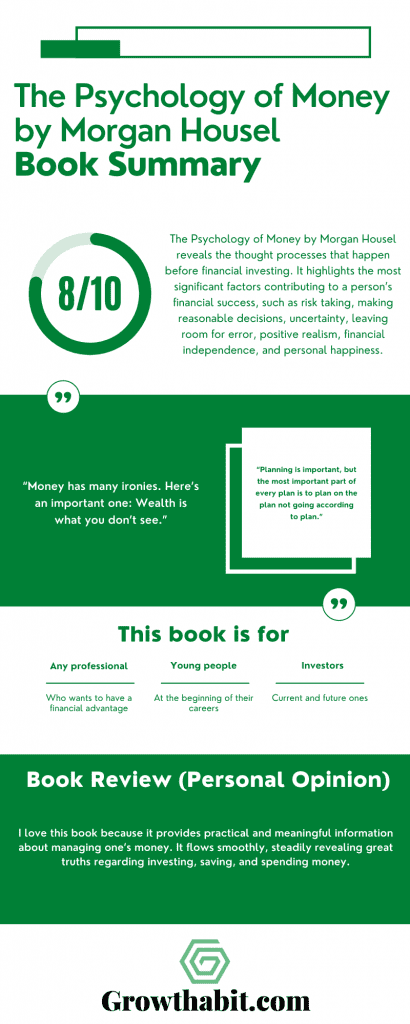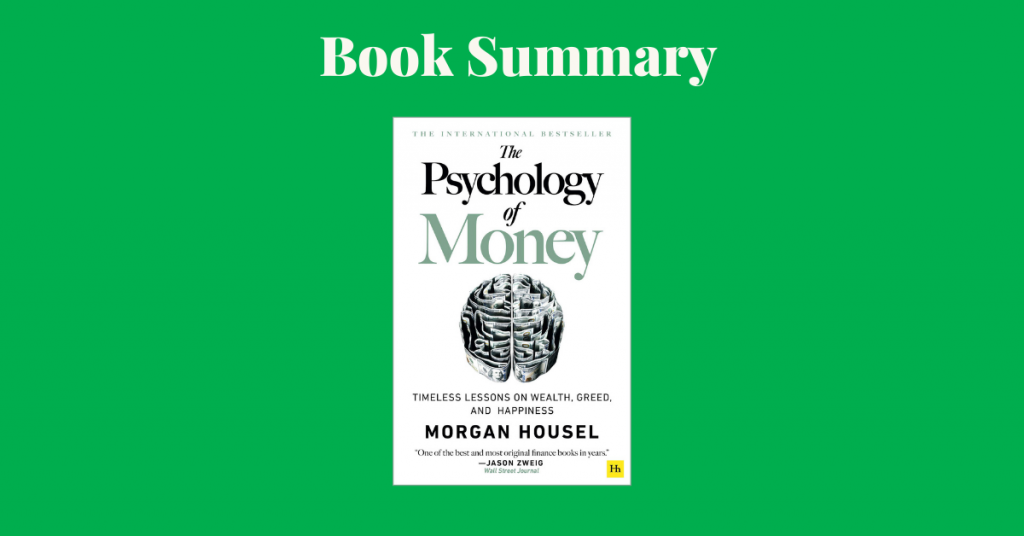The Psychology of Money by Morgan Housel reveals the thought processes that happen before financial investing.
It highlights the most significant factors contributing to a person’s financial success, such as risk taking, making reasonable decisions, uncertainty, leaving room for error, positive realism, financial independence, and personal happiness.
Book Title: The Psychology of Money: Timeless Lessons on Wealth, Greed, and Happiness
Author: Morgan Housel
Date of Reading: December 2021
Rating: 8/10
What Is Being Said In Detail:
Apart from the in-depth analysis of the psychology of money, the book serves as a practical guide for becoming a better investor, regardless of the experience you have in the financial world.
No One’s Crazy
Chapter 1 emphasizes the subjectivity with which we approach the topic of money.
Every person has a unique view of the world, which indicates that people also “respond to financial information” differently. People base their money decisions on what seems logical to them at a given moment of time.
Luck & Risk
Chapter 2 warns us that there are other factors, such as luck and risk, that play an important role in the outcomes of our actions.
It also discourages us to base our decisions and actions on highly unique success stories and people. As a matter of fact, it advises us to look for “broad patterns of success and failure.”
Never Enough
Chapter 3 sheds light on a particularly hard financial skill, which is realizing when enough is enough.
Having ‘enough’ is not an indicator that you’ve missed opportunities to invest and make more money. It’s an indicator that you are not willing to make a decision you would regret.
It also stresses the fact that some things in life are invaluable (family, freedom, independence, etc.), so no potential gain is worth the risk of losing them.
Confounding Compounding
Chapter 4 reveals what good investing is. It emphasizes the importance of having “little growth” that will prompt more massive “future growth.”
Since compounding may not be easily visible, people tend to underestimate its potential.
Getting Wealthy vs. Staying Wealthy
Chapter 5 draws a parallel between the behavior that results in amassing wealth and the one that results in preserving the acquired wealth.
Getting wealthy is inevitably linked to taking risks and being bold, whereas staying wealthy is linked to shying away from risks and being more modest.
Tail, You Win
Chapter 6 talks about tail events, which happen extremely rarely, but which make an immense impact on the world of finance.
Tails influence everything in the business world, so it doesn’t come as a surprise that many of your plans can go sideways.
Freedom
Chapter 7 identifies freedom as “the highest form of wealth.” Being in control of your time and your life is a great indicator of a person’s well-being.
Whenever people discuss happiness, they link it to time spent with family and friends, and not to their financial prowess.
Man in the Car Paradox
Chapter 8 reveals people’s wish to be respected based on their horsepower and other forms of display of wealth.
It reflects their pride and vanity because they are under the impression that other people will admire them for their material possessions.
Sadly, there are other qualities that will earn you more respect, such as empathy and kind-heartedness, and generosity.
Wealth is What You Don’t See
Chapter 9 presents a view on wealth that might be considered counterintuitive. Numerous people believe that expensive cars and multiple luxury homes represent wealth.
However, the money display means that you are rich, not wealthy. The main difference between being rich and being wealthy is that wealth is money not spent. Wealth is opportunity and flexibility.
Save Money
Chapter 10 identifies a major tool for building wealth: saving. Saving is often overlooked in the financial world, although it plays a key role in getting and staying wealthy.
A lot of people approach saving money with a specific goal in mind; however, you can save money for a future opportunity and for greater freedom.
Reasonable > Rational
Chapter 11 suggests that cold rationality cannot be successfully applied in the financial world.
We are all human beings, and we all have a unique point of view of the world, so being reasonable when making financial decisions or investments is more than enough.
Surprise!
Chapter 12 warns the readers that understanding history can influence our present and future expectations, however it cannot help us predict the future.
Investing involves a lot of less-than-perfect decisions with the “limited information” we have.
Surprises are the only certain thing in the world of investments since the state of the global economy has both directly and indirectly resulted from only a few past events.
Room for Error
Chapter 13 reinforces the notion of making errors in the world of finance. Any financial decision, or a plan, needs to have room for error, or a “margin of safety,” which will help you succeed in an area riddled with uncertainties.
Keep in mind that if there is a possibility for something to go wrong, it is likely that we will. The trick is to predict this risk and to be prepared for it in order to avoid financial catastrophe.
You’ll Change
Chapter 14 explores the topic of change and how it affects our financial planning. Trying to accomplish goals without factoring in changes in the world and in your personality is futile and nonsensical.
People are neither isolated entities, nor are they impervious to change. Accepting change will help you minimize or avoid regret in the future altogether.
Nothing’s Free
Chapter 15 makes an immensely significant point – nothing is free. Some people do not realize this simple, but hard truth because the price of things can be invisible until they experience them.
Investing has a price that can be expressed in uncertainty, regret, stress, but also in success and freedom.
Not being able to perceive investing success easily may prevent people from becoming a part of the world of investments.
You & Me
Chapter 16 talks about bubbles that come into existence when an assent has momentum, which, in turn, attracts short-term traders.
In these instances people do behave rationally and want to use the new potential and take a piece of the action for themselves.
The Seduction of Pessimism
Chapter 17 sheds light on the prevalence of pessimism among intellectuals. It is a misguided belief that optimists blindly believe that everything is wonderful.
Optimists are aware that there are obstacles, however they do hope that the final outcome will be positive despite the setbacks.
Pessimists focus on the problems because they happen more frequently and quickly, whereas progress takes time.
When You’ll Believe Anything
Chapter 18 deals with people’s desire to fill the gaps in narratives due to the fact that there isn’t a person who has a complete picture of how the world works.
The danger of having an incomplete view is that we tend to shape the narratives in ways that work for us. We start believing in something simply because we want it to be true.
Such behavior can have a major negative effect on our financial decisions and plans.
All Together Now
Chapter 19 is a summary of the most important lessons in the previous 18 chapters. It synthesizes the most important takeaways from each chapter in a clear and concise way.
It emphasizes the importance of saving, freedom, leaving room for error, embracing luck and risk, and making informed, reasonable decisions.
Confessions
Chapter 20 is precisely that – a confession by author Morgan Housel about what works for him. He admits that he saves money because he enjoys the freedom, flexibility, and opportunities that money provides for him and his family.
Most Important Keywords, Sentences, Quotes:
INTRODUCTION – The Greatest Show on Earth
“A genius who loses control of their emotions can be a financial disaster. The opposite is also true. Ordinary folks with no financial education can be wealthy if they have a handful of behavioral skills that have nothing to do with formal measures of intelligence.”
“In what other industry does someone with no college degree, no training, no background, no formal experience, and no connections massively outperform someone with the best education, the best training, and the best connections? I struggle to think of any.”
“Through collective trial and error over the years we learned how to become better farmers, skilled plumbers, and advanced chemists. But has trial and error taught us to become better with our personal finances? Are we less likely to bury ourselves in debt?
More likely to save for a rainy day? Prepare for retirement? Have realistic views about what money does, and doesn’t do, to our happiness? I’ve seen no compelling evidence.”
“Money is everywhere, it affects all of us, and confuses most of us. Everyone thinks about it a little differently. It offers lessons on things that apply to many areas of life, like risk, confidence, and happiness.
Few topics offer a more powerful magnifying glass that helps explain why people behave the way they do than money. It is one of the greatest shows on Earth.”
CHAPTER 1 – No One’s Crazy
“Everyone has their own unique experience with how the world works. And what you’ve experienced is more compelling than what you learn secondhand.
So all of us—you, me, everyone—go through life anchored to a set of views about how money works that vary wildly from person to person. What seems crazy to you might make sense to me.”
“We all think we know how the world works. But we’ve all only experienced a tiny sliver of it.
As investor Michael Batnick says, ‘some lessons have to be experienced before they can be understood.’ We are all victims, in different ways, to that truth.”
“No one should expect them to respond to financial information the same way. No one should assume they are influenced by the same incentives.
No one should expect them to trust the same sources of advice. No one should expect them to agree on what matters, what’s worth it, what’s likely to happen next, and what the best path forward is.”
“We all do crazy stuff with money, because we’re all relatively new to this game and what looks crazy to you might make sense to me.
But no one is crazy—we all make decisions based on our own unique experiences that seem to make sense to us in a given moment.”
CHAPTER 2 – Luck & Risk
“Luck and risk are siblings. They are both the reality that every outcome in life is guided by forces other than individual effort.”
“Luck and risk are both the reality that every outcome in life is guided by forces other than individual effort. They are so similar that you can’t believe in one without equally respecting the other.
They both happen because the world is too complex to allow 100% of your actions to dictate 100% of your outcomes. They are driven by the same thing: You are one person in a game with seven billion other people and infinite moving parts.
The accidental impact of actions outside of your control can be more consequential than the ones you consciously take.”
“Be careful who you praise and admire. Be careful who you look down upon and wish to avoid becoming. Or, just be careful when assuming that 100% of outcomes can be attributed to effort and decisions.”
“Some people are born into families that encourage education; others are against it. Some are born into flourishing economies encouraging of entrepreneurship; others are born into war and destitution.
I want you to be successful, and I want you to earn it. But realize that not all success is due to hard work, and not all poverty is due to laziness. Keep this in mind when judging people, including yourself.”
“You’ll get closer to actionable takeaways by looking for broad patterns of success and failure. The more common the pattern, the more applicable it might be to your life.”
CHAPTER 3 – Never Enough
“If you risk something that is important to you for something that is unimportant to you, it just does not make any sense. There is no reason to risk what you have and need for what you don’t have and don’t need.”
“The hardest financial skill is getting the goalpost to stop moving. But it’s one of the most important. If expectations rise with results there is no logic in striving for more because you’ll feel the same after putting in extra effort.
It gets dangerous when the taste of having more—more money, more power, more prestige—increases ambition faster than satisfaction. In that case one step forward pushes the goalpost two steps ahead.”
“The idea of having “enough” might look like conservatism, leaving opportunity and potential on the table.
I don’t think that’s right. “Enough” is realizing that the opposite—an insatiable appetite for more— will push you to the point of regret.”
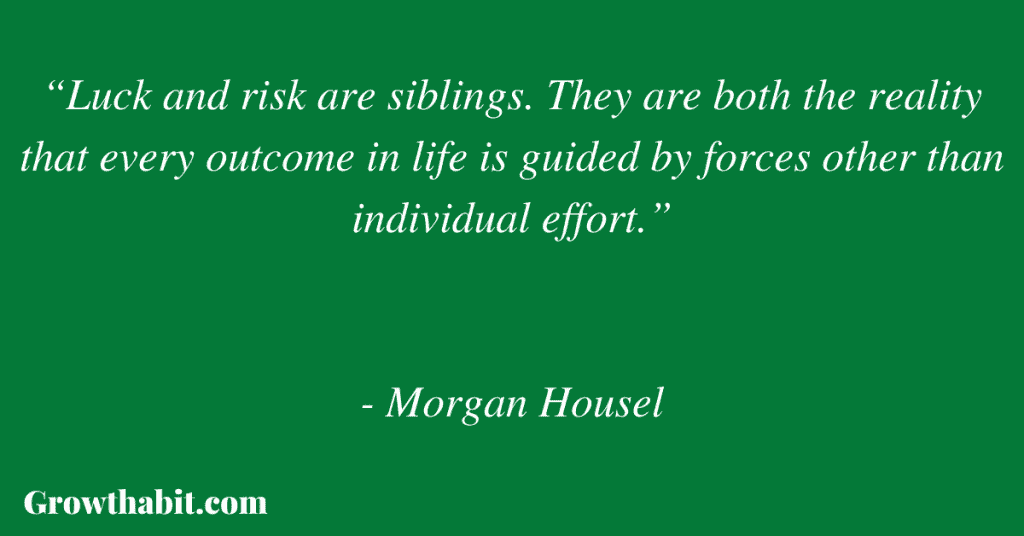
“Reputation is invaluable. Freedom and independence are invaluable. Family and friends are invaluable. Being loved by those who you want to love you is invaluable.
Happiness is invaluable. And your best shot at keeping these things is knowing when it’s time to stop taking risks that might harm them. Knowing when you have enough.”
CHAPTER 4 – Confounding Compounding
“Lessons from one field can often teach us something important about unrelated fields.”
“If something compounds—if a little growth serves as the fuel for future growth—a small starting base can lead to results so extraordinary they seem to defy logic.
It can be so logic-defying that you underestimate what’s possible, where growth comes from, and what it can lead to. And so it is with money.”
“You never get accustomed to how quickly things can grow. The danger here is that when compounding isn’t intuitive we often ignore its potential and focus on solving problems through other means.
Not because we’re overthinking, but because we rarely stop to consider compounding potential.”
“You can’t blame people for devoting all their effort—effort in what they learn and what they do—to trying to earn the highest investment returns. It intuitively seems like the best way to get rich.
But good investing isn’t necessarily about earning the highest returns, because the highest returns tend to be one-off hits that can’t be repeated.
It’s about earning pretty good returns that you can stick with and which can be repeated for the longest period of time. That’s when compounding runs wild.”
CHAPTER 5 – Getting Wealthy vs. Staying Wealthy
“Capitalism is hard. But part of the reason this happens is because getting money and keeping money are two different skills. Getting money requires taking risks, being optimistic, and putting yourself out there.
But keeping money requires the opposite of taking risk. It requires humility, and fear that what you’ve made can be taken away from you just as fast.
It requires frugality and an acceptance that at least some of what you’ve made is attributable to luck, so past success can’t be relied upon to repeat indefinitely.”
“Compounding only works if you can give an asset years and years to grow. It’s like planting oak trees: A year of growth will never show much progress, 10 years can make a meaningful difference, and 50 years can create something absolutely extraordinary.
But getting and keeping that extraordinary growth requires surviving all the unpredictable ups and downs that everyone inevitably experiences over time.”
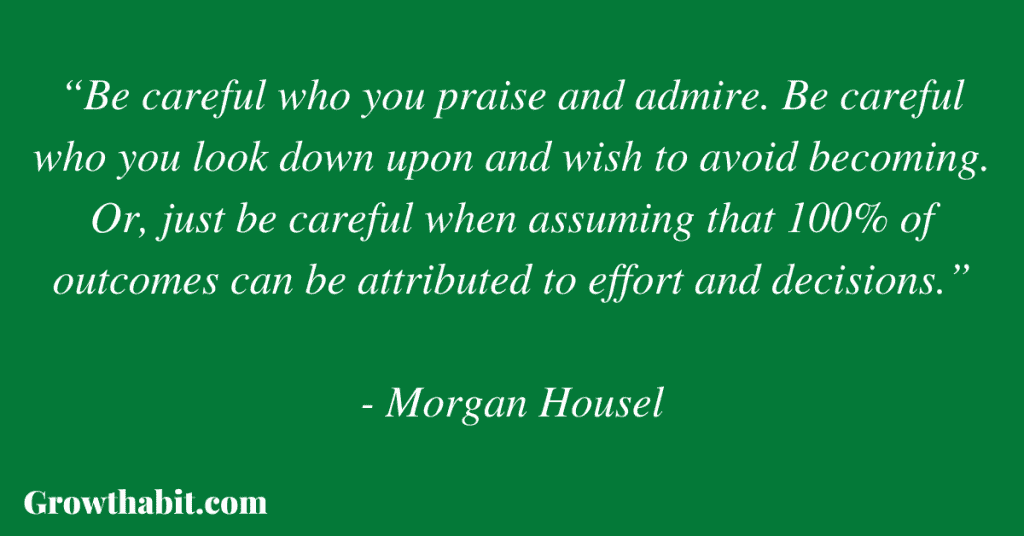
“More than I want big returns, I want to be financially unbreakable. And if I’m unbreakable I actually think I’ll get the biggest returns, because I’ll be able to stick around long enough for compounding to work wonders.”
“Planning is important, but the most important part of every plan is to plan on the plan not going according to plan.”
“A plan is only useful if it can survive reality. And a future filled with unknowns is everyone’s reality. A good plan doesn’t pretend this weren’t true; it embraces it and emphasizes room for error.”
“A barbelled personality—optimistic about the future, but paranoid about what will prevent you from getting to the future—is vital.”
CHAPTER 6 – Tail, You Win
“Long tails—the farthest ends of a distribution of outcomes—have tremendous influence in finance, where a small number of events can account for the majority of outcomes.
That can be hard to deal with, even if you understand the math. It is not intuitive that an investor can be wrong half the time and still make a fortune.”
“Anything that is huge, profitable, famous, or influential is the result of a tail event—an outlying one-in-thousands or millions event.
And most of our attention goes to things that are huge, profitable, famous, or influential. When most of what we pay attention to is the result of a tail, it’s easy to underestimate how rare and powerful they are.”
“Most financial advice is about today. What should you do right now, and what stocks look like good buys today? But most of the time today is not that important.
Over the course of your lifetime as an investor the decisions that you make today or tomorrow or next week will not matter nearly as much as what you do during the small number of days—likely 1% of the time or less—when everyone else around you is going crazy.”
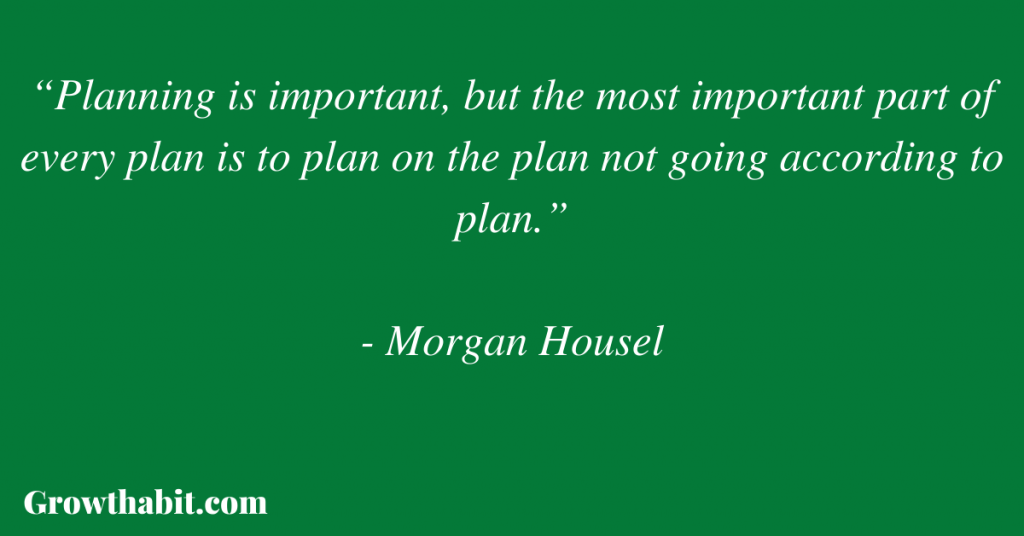
“When you accept that tails drive everything in business, investing, and finance you realize that it’s normal for lots of things to go wrong, break, fail, and fall.”
“When we pay special attention to a role model’s successes we overlook that their gains came from a small percent of their actions.
That makes our own failures, losses, and setbacks feel like we’re doing something wrong.
But it’s possible we are wrong, or just sort of right, just as often as the masters are. They may have been more right when they were right, but they could have been wrong just as often as you.”
CHAPTER 7 – Freedom
“The highest form of wealth is the ability to wake up every morning and say, “I can do whatever I want today.”
“Having a strong sense of controlling one’s life is a more dependable predictor of positive feelings of wellbeing than any of the objective conditions of life we have considered. More than your salary. More than the size of your house. More than the prestige of your job.
Control over doing what you want, when you want to, with the people you want to, is the broadest lifestyle variable that makes people happy.”
“Rockefeller’s job wasn’t to drill wells, load trains, or move barrels. It was to think and make good decisions.
Rockefeller’s product—his deliverable— wasn’t what he did with his hands, or even his words. It was what he figured out inside his head. So that’s where he spent most of his time and energy.”
“No one—not a single person out of a thousand—said that to be happy you should try to work as hard as you can to make money to buy the things you want.
No one—not a single person—said it’s important to be at least as wealthy as the people around you, and if you have more than they do it’s real success.
No one—not a single person—said you should choose your work based on your desired future earning power.
What they did value were things like quality friendships, being part of something bigger than themselves, and spending quality, unstructured time with their children.”
CHAPTER 8 – Man in the Car Paradox
“When you see someone driving a nice car, you rarely think, “Wow, the guy driving that car is cool.” Instead, you think, “Wow, if I had that car people would think I’m cool.” Subconscious or not, this is how people think.
There is a paradox here: people tend to want wealth to signal to others that they should be liked and admired.
But in reality those other people often bypass admiring you, not because they don’t think wealth is admirable, but because they use your wealth as a benchmark for their own desire to be liked and admired.”
“My point here is not to abandon the pursuit of wealth. Or even fancy cars. I like both.
It’s a subtle recognition that people generally aspire to be respected and admired by others, and using money to buy fancy things may bring less of it than you imagine.
If respect and admiration are your goal, be careful how you seek it. Humility, kindness, and empathy will bring you more respect than horsepower ever will.”
CHAPTER 9 – Wealth is What You Don’t See
“Money has many ironies. Here’s an important one: Wealth is what you don’t see.”
“We tend to judge wealth by what we see, because that’s the information we have in front of us.
We can’t see people’s bank accounts or brokerage statements. So we rely on outward appearances to gauge financial success. Cars. Homes. Instagram photos.”
“Wealth is the nice cars not purchased. The diamonds not bought. The watches not worn, the clothes forgone and the first-class upgrade declined.
Wealth is financial assets that haven’t yet been converted into the stuff you see. That’s not how we think about wealth, because you can’t contextualize what you can’t see.”
“We should be careful to define the difference between wealthy and rich. It is more than semantics. Not knowing the difference is a source of countless poor money decisions.
Rich is a current income. Someone driving a $100,000 car is almost certainly rich, because even if they purchased the car with debt you need a certain level of income to afford the monthly payment.
Same with those who live in big homes. It’s not hard to spot rich people. They often go out of their way to make themselves known. But wealth is hidden. It’s income not spent.
Wealth is an option not yet taken to buy something later. Its value lies in offering you options, flexibility, and growth to one day purchase more stuff than you could right now.”
“The danger here is that I think most people, deep down, want to be wealthy. They want freedom and flexibility, which is what financial assets not yet spent can give you.
But it is so ingrained in us that to have money is to spend money that we don’t get to see the restraint it takes to actually be wealthy. And since we can’t see it, it’s hard to learn about it.”
CHAPTER 10 – Save Money
“Building wealth has little to do with your income or investment returns, and lots to do with your savings rate.”
“Investment returns can make you rich. But whether an investing strategy will work, and how long it will work for, and whether markets will cooperate, is always in doubt.
Results are shrouded in uncertainty. Personal savings and frugality—finance’s conservation and efficiency—are parts of the money equation that are more in your control and have a 100% chance of being as effective in the future as they are today.”
“Everyone needs the basics. Once they’re covered there’s another level of comfortable basics, and past that there’s basics that are both comfortable, entertaining, and enlightening.
But spending beyond a pretty low level of materialism is mostly a reflection of ego approaching income, a way to spend money to show people that you have (or had) money.”
“Some people save money for a downpayment on a house, or a new car, or for retirement. That’s great, of course.
But saving does not require a goal of purchasing something specific. You can save just for saving’s sake. And indeed you should. Everyone should.”
CHAPTER 11 – Reasonable > Rational
“With it comes something that often goes overlooked: Do not aim to be coldly rational when making financial decisions. Aim to just be pretty reasonable.
Reasonable is more realistic and you have a better chance of sticking with it for the long run, which is what matters most when managing money.”
“Academic finance is devoted to finding the mathematically optimal investment strategies. My own theory is that, in the real world, people do not want the mathematically optimal strategy.
They want the strategy that maximizes for how well they sleep at night.”

“My own view is that people are neither rational nor irrational. We are human. We don’t like to think harder than we need to, and we have unceasing demands on our attention.”
“Day trading and picking individual stocks is not rational for most investors —the odds are heavily against your success.
But they’re both reasonable in small amounts if they scratch an itch hard enough to leave the rest of your more diversified investments alone.”
CHAPTER 12 – Surprise!
“It is smart to have a deep appreciation for economic and investing history.
History helps us calibrate our expectations, study where people tend to go wrong, and offers a rough guide of what tends to work. But it is not, in any way, a map of the future.”
“Investing is not a hard science. It’s a massive group of people making imperfect decisions with limited information about things that will have a massive impact on their wellbeing, which can make even smart people nervous, greedy and paranoid.”
“The cornerstone of economics is that things change over time, because the invisible hand hates anything staying too good or too bad indefinitely.”
“The most important driver of anything tied to money is the stories people tell themselves and the preferences they have for goods and services. Those things don’t tend to sit still.
They change with culture and generation. They’re always changing and always will. The mental trick we play on ourselves here is an over-admiration of people who have been there, done that, when it comes to money.
Experiencing specific events does not necessarily qualify you to know what will happen next. In fact it rarely does, because experience leads to overconfidence more than forecasting ability.”
“The majority of what’s happening at any given moment in the global economy can be tied back to a handful of past events that were nearly impossible to predict.
The most common plot of economic history is the role of surprises.”
CHAPTER 13 – Room for Error
“History is littered with good ideas taken too far, which are indistinguishable from bad ideas.
The wisdom in having room for error is acknowledging that uncertainty, randomness, and chance—’unknowns’—are an ever-present part of life.
The only way to deal with them is by increasing the gap between what you think will happen and what can happen while still leaving you capable of fighting another day.”
“Margin of safety—you can also call it room for error or redundancy—is the only effective way to safely navigate a world that is governed by odds, not certainties.
And almost everything related to money exists in that kind of world. Forecasting with precision is hard.
This is obvious to the card counter, because no one could possibly know where a particular card lies in a shuffled deck.”
“But room for error is underappreciated and misunderstood. It’s often viewed as a conservative hedge, used by those who don’t want to take much risk or aren’t confident in their views.
But when used appropriately, it’s quite the opposite. Room for error lets you endure a range of potential outcomes, and endurance lets you stick around long enough to let the odds of benefiting from a low-probability outcome fall in your favor.”
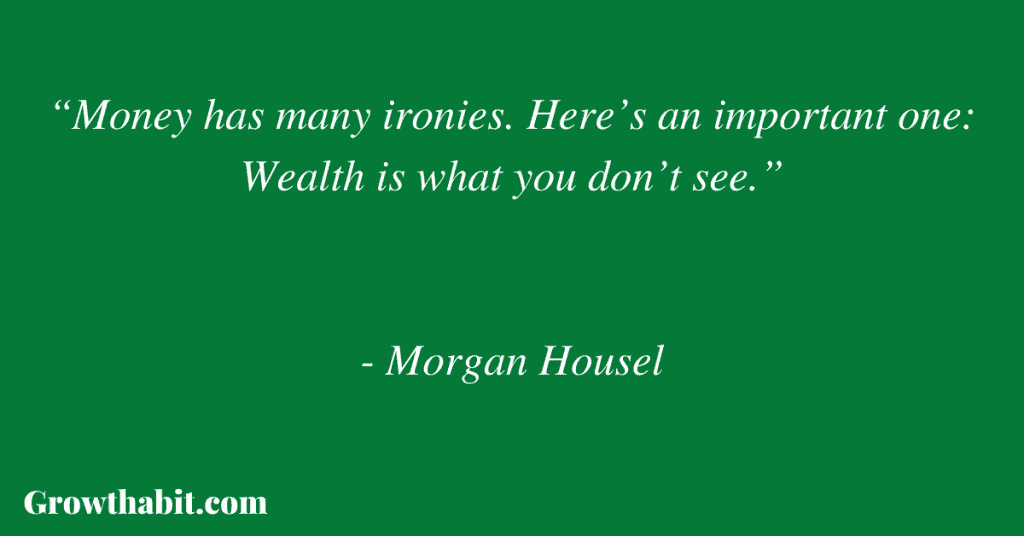
“An important cousin of room for error is what I call optimism bias in risktaking, or “Russian roulette should statistically work” syndrome: An attachment to favorable odds when the downside is unacceptable in any circumstances.
Nassim Taleb says, ‘You can be risk loving and yet completely averse to ruin.’ And indeed, you should. The idea is that you have to take risk to get ahead, but no risk that can wipe you out is ever worth taking.
The odds are in your favor when playing Russian roulette. But the downside is not worth the potential upside. There is no margin of safety that can compensate for the risk.”
“A good rule of thumb for a lot of things in life is that everything that can break will eventually break.
So if many things rely on one thing working, and that thing breaks, you are counting the days to catastrophe. That’s a single point of failure.”
CHAPTER 14 – You’ll Change
“Imagining a goal is easy and fun. Imagining a goal in the context of the realistic life stresses that grow with competitive pursuits is something entirely different. This has a big impact on our ability to plan for future financial goals.”
“Long-term financial planning is essential. But things change—both the world around you, and your own goals and desires. It is one thing to say, ‘We don’t know what the future holds.’
It’s another to admit that you, yourself, don’t know today what you will even want in the future. And the truth is, few of us do.
It’s hard to make enduring long-term decisions when your view of what you’ll want in the future is likely to shift.”
“We should avoid the extreme ends of financial planning. Assuming you’ll be happy with a very low income, or choosing to work endless hours in pursuit of a high one, increases the odds that you’ll one day find yourself at a point of regret.”
“We should also come to accept the reality of changing our minds.
Some of the most miserable workers I’ve met are people who stay loyal to a career only because it’s the field they picked when deciding on a college major at age 18.”
“Embracing the idea that financial goals made when you were a different person should be abandoned without mercy versus put on life support and dragged on can be a good strategy to minimize future regret.
The quicker it’s done, the sooner you can get back to compounding.”
CHAPTER 15 – Nothing’s Free
“Everything has a price, and the key to a lot of things with money is just figuring out what that price is and being willing to pay it.
The problem is that the price of a lot of things is not obvious until you’ve experienced them firsthand, when the bill is overdue.”
“Every job looks easy when you’re not the one doing it because the challenges faced by someone in the arena are often invisible to those in the crowd.
Dealing with the conflicting demands of sprawling bloat, short-term investors, regulators, unions, and entrenched bureaucracy is not only hard to do, but it’s hard to even recognize the severity of the problems until you’re the one dealing with them.”
“Like everything else worthwhile, successful investing demands a price. But its currency is not dollars and cents. It’s volatility, fear, doubt, uncertainty, and regret—all of which are easy to overlook until you’re dealing with them in real time.
The inability to recognize that investing has a price can tempt us to try to get something for nothing. Which, like shoplifting, rarely ends well.”
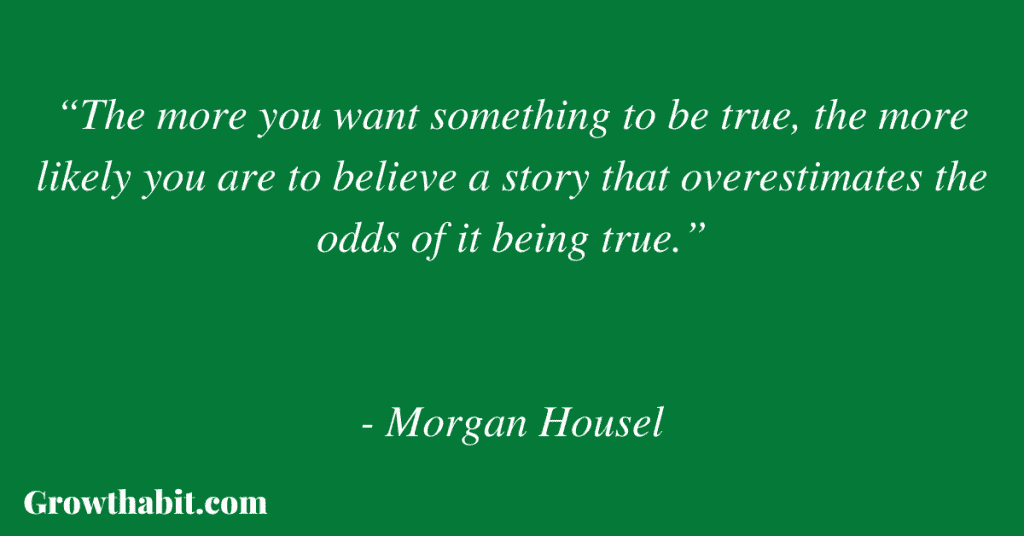
“The question is: Why do so many people who are willing to pay the price of cars, houses, food, and vacations try so hard to avoid paying the price of good investment returns? The answer is simple: The price of investing success is not immediately obvious.”
“The trick is convincing yourself that the market’s fee is worth it.
That’s the only way to properly deal with volatility and uncertainty—not just putting up with it, but realizing that it’s an admission fee worth paying.
There’s no guarantee that it will be. Sometimes it rains at Disneyland. But if you view the admission fee as a fine, you’ll never enjoy the magic. Find the price, then pay it.”
CHAPTER 16 – You & Me
“An iron rule of finance is that money chases returns to the greatest extent that it can.
If an asset has momentum—it’s been moving consistently up for a period of time—it’s not crazy for a group of short-term traders to assume it will keep moving up.
Not indefinitely; just for the short period of time they need it to. Momentum attracts short-term traders in a reasonable way.”
“Bubbles form when the momentum of short-term returns attracts enough money that the makeup of investors shifts from mostly long term to mostly short term. That process feeds on itself.
As traders push up short-term returns, they attract even more traders. Before long—and it often doesn’t take long—the dominant market price-setters with the most authority are those with shorter time horizons.
Bubbles aren’t so much about valuations rising. That’s just a symptom of something else: time horizons shrinking as more short-term traders enter the playing field.”
“The formation of bubbles isn’t so much about people irrationally participating in long-term investing. They’re about people somewhat rationally moving toward short-term trading to capture momentum that had been feeding on itself.
What do you expect people to do when momentum creates a big short-term return potential? Sit and watch patiently? Never. That’s not how the world works. Profits will always be chased.
And short-term traders operate in an area where the rules governing long-term investing—particularly around valuation—are ignored, because they’re irrelevant to the game being played.”
CHAPTER 17 – The Seduction of Pessimism
“Pessimism isn’t just more common than optimism. It also sounds smarter. It’s intellectually captivating, and it’s paid more attention than optimism, which is often viewed as being oblivious to risk.”
“Real optimists don’t believe that everything will be great. That’s complacency.
Optimism is a belief that the odds of a good outcome are in your favor over time, even when there will be setbacks along the way.
The simple idea that most people wake up in the morning trying to make things a little better and more productive than wake up looking to cause trouble is the foundation of optimism.
It’s not complicated. It’s not guaranteed, either. It’s just the most reasonable bet for most people, most of the time.
The late statistician Hans Rosling put it differently: ‘I am not an optimist. I am a very serious possibilist.’”
“Tell someone that everything will be great and they’re likely to either shrug you off or offer a skeptical eye. Tell someone they’re in danger and you have their undivided attention.
If a smart person tells me they have a stock pick that’s going to rise 10-fold in the next year, I will immediately write them off as full of nonsense.
If someone who’s full of nonsense tells me that a stock I own is about to collapse because it’s an accounting fraud, I will clear my calendar and listen to their every word.”
“Pessimists often extrapolate present trends without accounting for how markets adapt.”
“Progress happens too slowly to notice, but setbacks happen too quickly to ignore.”
“It’s easier to create a narrative around pessimism because the story pieces tend to be fresher and more recent.
Optimistic narratives require looking at a long stretch of history and developments, which people tend to forget and take more effort to piece together.
Consider the progress of medicine. Looking at the last year will do you little good. Any single decade won’t do much better. But looking at the last 50 years will show something extraordinary.”
CHAPTER 18 – When You’ll Believe Anything
“The more you want something to be true, the more likely you are to believe a story that overestimates the odds of it being true.”
“If you desperately need a solution and a good one isn’t known or readily available to you, the path of least resistance is toward Hajaji’s reasoning: willing to believe anything. Not just try anything, but believe it.”
“Everyone has an incomplete view of the world. But we form a complete narrative to fill in the gaps.”
“Hindsight, the ability to explain the past, gives us the illusion that the world is understandable.
It gives us the illusion that the world makes sense, even when it doesn’t make sense. That’s a big deal in producing mistakes in many fields.
Most people, when confronted with something they don’t understand, do not realize they don’t understand it because they’re able to come up with an explanation that makes sense based on their own unique perspective and experiences in the world, however limited those experiences are.
We all want the complicated world we live in to make sense. So we tell ourselves stories to fill in the gaps of what are effectively blind spots.”
“When I’m blind to parts of how the world works I might completely misunderstand why the stock market is behaving like it is, in a way that gives me too much confidence in my ability to know what it might do next.”
CHAPTER 19 – All Together Now
“Respect the power of luck and risk and you’ll have a better chance of focusing on things you can actually control. You’ll also have a better chance of finding the right role models.”
“Saving money is the gap between your ego and your income, and wealth is what you don’t see.”
“If you want to do better as an investor, the single most powerful thing you can do is increase your time horizon.”
“You can be wrong half the time and still make a fortune, because a small minority of things account for the majority of outcomes.”
“Use money to gain control over your time, because not having control of your time is such a powerful and universal drag on happiness.”
“Save. Just save. You don’t need a specific reason to save.”
“Define the cost of success and be ready to pay it. Because nothing worthwhile is free. And remember that most financial costs don’t have visible price tags.”
“Avoid the extreme ends of financial decisions.”
“Respect the mess. Smart, informed, and reasonable people can disagree in finance, because people have vastly different goals and desires. There is no single right answer; just the answer that works for you.”
CHAPTER 20 – Confessions
“We can leave aside rich, but independence has always been my personal financial goal. Chasing the highest returns or leveraging my assets to live the most luxurious life has little interest to me.
Both look like games people do to impress their friends, and both have hidden risks. I mostly just want to wake up every day knowing my family and I can do whatever we want to do on our own terms. Every financial decision we make revolves around that goal.”
“Being able to wake up one morning and change what you’re doing, on your own terms, whenever you’re ready, seems like the grandmother of all financial goals.
Independence, to me, doesn’t mean you’ll stop working. It means you only do the work you like with people you like at the times you want for as long as you want.”
“The independent feeling I get from owning our house outright far exceeds the known financial gain I’d get from leveraging our assets with a cheap mortgage.
Eliminating the monthly payment feels better than maximizing the long-term value of our assets. It makes me feel independent.”
“Over the years I came around to the view that we’ll have a high chance of meeting all of our family’s financial goals if we consistently invest money into a low-cost index fund for decades on end, leaving the money alone to compound.
A lot of this view comes from our lifestyle of frugal spending. If you can meet all your goals without having to take the added risk that comes from trying to outperform the market, then what’s the point of even trying?
I can afford to not be the greatest investor in the world, but I can’t afford to be a bad one.”
Book Review (Personal Opinion):
I love this book because it provides practical and meaningful information about managing one’s money. It flows smoothly, steadily revealing great truths regarding investing, saving, and spending money.
Rating: 8/10
This Book Is For:
- Current and future investors
- Any professional who wants to have a financial advantage
- Young people at the beginning of their careers
If You Want To Learn More
Here’s an interview with Morgan Housel in which he’s discussing the psychology of money:
TIP351: The Psychology Of Money W/ Morgan Housel
How I’ve Implemented The Ideas From The Book
I’ve made a decision to start saving without any particular goal in mind.
Having financial freedom and flexibility truly resonated with me. Also, I manage to incorporate room for error in anything I do because I accept that the world is complex and we cannot control every single outcome.
One Small Actionable Step You Can Do
Start saving even if you don’t have a specific goal in mind. Savings can give you flexibility, freedom, and opportunities.
